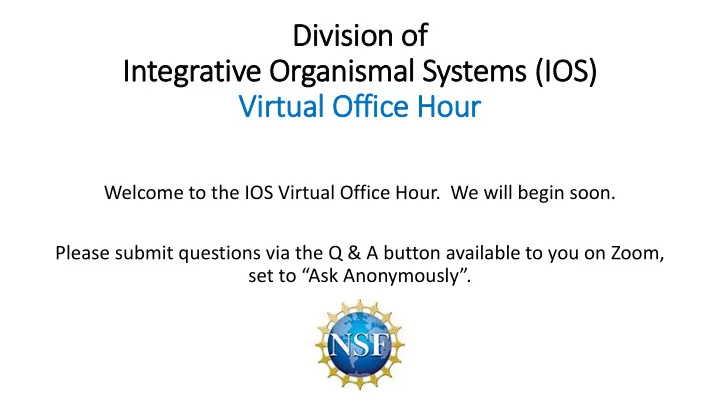

Div ivis ision of In Integrativ ive Organismal Systems (IO IOS) Vir irtual Office Hour Welcome to the IOS Virtual Office Hour. We will begin soon. Please submit questions via the Q & A button available to you on Zoom, set to “Ask Anonymously”.
Div ivis ision of Integrativ In ive Organismal Systems (IO IOS) Vir irtual Office Hour – Welc lcome! Program Directors in attendance today • D. Patrick Abbot – Behavioral Systems Cluster (dabbot@nsf.gov) • Anne Sylvester – Developmental Systems Cluster (asylvest@nsf.gov) • Edda (Floh) Thiels – Neural Systems Cluster (ethiels@nsf.gov) • Michael Mishkind – Physiological & Structural Systems Cluster (mmishkin@nsf.gov) • Gerald Schoenknecht – Plant Genome Research Program (gschoenk@nsf.gov) Facilitators – Jennifer Visosky, Nancy Arce
IOS Vir IO irtual Office Hour Questions: • Submit your questions via the Q & A button available to you on Zoom set to “Ask Anonymously”. • For recently asked questions and future office hour topics, see the IOS blog (www.iosblog.nsfbio.com) • For specific questions about your project, please contact a Program Director • Next IOS Virtual Office Hour: September 17 th , 2020
IO IOS Vir irtual Office Hour Today’s Topics: • Recent solicitations and Dear Colleague Letters (DCLs) • Enabling Discovery through GEnomic Tools (EDGE) • Open question and answer period Submit your questions via the chat/message box on your screen !
Recent Solicitatio ions and DCLs Core IOS solicitation (20-536) has no deadlines and no submission limits. PBI (20- 576) and PGRP (18-579) no deadlines, no limits • NSF 20-116: DCL: Planning for Midscale Infrastructure for the Biological Sciences • NSF 20-587: Graduate Research Fellowship Program – time for senior undergraduates to start thinking about these. Life Sciences applications due 19 October 2020 • NSF 20-585: Ecology and Evolution of Infectious Diseases (EEID) – updated solicitation, full proposals due 18 November 2020 • NSF 20-595: Innovations in Graduate Education (IGE) – updated solicitation, full proposals due 4 November 2020 • NSF 20-598: International Research Experiences for Students (IRES) – updated solicitation, full proposals for Track I (IRES Sites) due 12 November 2020, for Track II (Advanced Studies Institutes) due 9 November 2020
COVID-19 19 We recognize that developments related to COVID-19 continue to cause havoc and disruption of research programs and lives. Please see NSF’s main page for information related to OMB Memorandum M -20-17 and NSF’s implementation of the memorandum, CDC guidance, Department of State travel information, and research-related information: https://www.nsf.gov/news/special_reports/coronavirus/ Please note: If you have an ongoing award and your research has been impacted by COVID-19 responses at your university or field site please make note of that in your annual reports in the Changes/Problems section
Behavioral Systems Division of Integrative 1. Animal Behavior Program Organismal Systems (IOS) Developmental Systems 2. Animal Developmental Mechanisms Program IOS IMAGiNE 3. Evolution of Developmental Mechanisms Program 4. Plant, Fungal, and Microbial Developmental Mechanisms Program Neural Systems I ntegrating 5. Organization Program M echanisms of 6. Activation Program 7. Modulation Program A daptation with G enes Physiological and Structural Systems 8. Symbiosis, Infection and Immunity Program *** i n 9. Plant Biotic Interactions Program 10. Physiological Mechanisms and Biomechanics Program N etworks and across 11. Integrative Ecological Physiology Program E nvironments 12. Plant Genome Research Program See DCL NSF 20-044 for more on IMAGiNE 13. Enabling Discovery through Genomic Tools Program Study of mechanisms underlying functional phenotypes, resilience, and robustness
Enabling Dis iscovery ry through GE GEnomic Tools (EDGE) developing tools & resources and testing hypotheses in diverse organisms • Connecting genotype and environment to phenotype in diverse plants, animals, microbes, viruses, or fungi • Tools, approaches, and infrastructure for building and benefiting research communities • Hypothesis-driven research into mechanisms that underly complex multigenic traits • Inquiries: BIOEDGE@nsf.gov
NSF 20-532 Current solicitation FUNCTIONAL GENOMIC TOOLS TRACK: develop tools for gene manipulation and/or phenotyping, analytical approaches, or infrastructure to enable direct tests of gene function on demand in diverse plants, animals, microbes, viruses, or fungi for which these methods are presently unavailable COMPLEX MULTIGENIC TRAITS TRACK: hypothesis-driven research to understand causal mechanisms connecting genomes and complex multigenic phenomes in non- model organisms across a variety of environmental, developmental, social, and/or genomic context Functional Genomics in Diverse Organisms
NSF 20-532 Current solicitation FUNCTIONAL GENOMICS TOOLS TRACK (FGT) For example: • Development of mutant libraries and/or high-quality reference genomes • Generalizable high-throughput phenotyping methods • Innovative approaches for manipulating individual genes or multiple genes simultaneously • Innovative approaches to test gene function in targeted, single cells in organisms • Innovative approaches for establishing function of single or networks of genes COMPLEX MULTIGENIC TRAITS TRACK (CMT) For example: • Systems-level analysis of the gene regulatory networks underlying complex traits • Innovative analytical approaches to linking genes and complex traits • Elucidation of the causal connections across levels of biological organization that underlie complex multigenic traits • Elucidation of multi-genome/epigenome interactions with the environment, with the goal of predicting complex organismal phenotypes across contexts No submission deadline
Recommend
More recommend